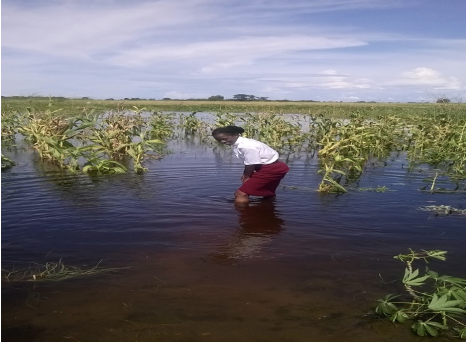By Rev. Chali Mfuta, United Church of Zambia
The climate crisis has had a negative impact on communities in countries in the Global South which do not have the financial capacity
to mitigate the effects. Earlier this year, on January 22, a tropical storm known as Cyclone Anna hit Madagascar, Mozambique, Malawi and Zambia. It caused death, destruction and power outages due to the heavy rains. In the southern part of Zambia, Namwala and Monze districts were very affected by these floods. It really is sad to see the damages, the loss, and the risks that people were exposed to and the mitigation for the same.
There was severe damage to all the crops as they were submerged in flood waters. Livestock and houses were swept away. This led to hunger in the communities which experienced these losses, making it hard for children, pregnant women and the elderly to survive.
In the communities of Nanwala and Monze alone, 32,448 households were displaced, leaving a number of people homeless. Everything was submerged in the water so that the affected people had to be airlifted from higher places or the small islands where they had sought refuge.
The risk of not having shelter, access to clean water and health facilities for vulnerable groups such as the elderly, children and the physically challenged led to fear of violation, abuse, and neglect. Permanent structures for shelter and health and safety services were urgently needed, as was nutrition.
Assistance came from different faith-based organizations, the Red Cross, the Zambian police force, the Ministry of Health and the government’s Disaster Management and Mitigation Unit. They provided items such as food, toiletries, clothes, tents and medicine, and even spiritual support.
When reaching out to the community, the priority must be affected households and families. The challenge is the rehabilitation and reconstruction of damaged or destroyed facilities including houses, schools, shops, markets, health facilities and police stations. COP28 is an opportunity to increase funding for these kinds of disasters which affect the most vulnerable communities. The type of funding should be grants and not loans.
The funds should be easily accessible in order to mitigate the disasters in good time to avoid losing lives.
As we work towards the climate justice the earth needs, let us also put in place policies and funding that will effectively respond to the damage and loss caused by climate change.
Rev. Chali Mfuta of the United Church of Zambia serves as minister in Livingstone, Zambia. She is attending COP28 virtually as part of The United Church of Canada delegation. Chali witnessed first-hand the devastating impacts of Cyclone Ana and is a strong climate justice advocate.
